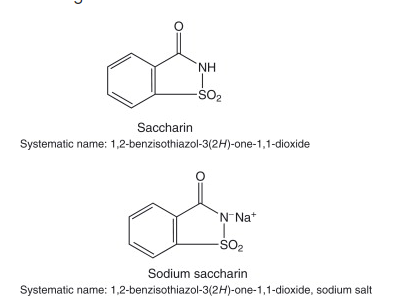Saccharin, cyclamates, aspartame, acesulfame-K are some of the widely used non-nutritive sweeteners. Non-nutritive saccharin sweentener is the oldest high-intensity sweetener. It is commercially available in three forms: acid saccharin, sodium saccharin, and calcium saccharin. Sodium saccharin is the most commonly used form because of its high solubility and stability. Saccharin and its salts in their solid form show good stability under conditions present in soft drinks. However, at low pH they can slowly hydrolyze to 2-sulfobenzoic acid and 2-sulfamoylbenzoic acid. Saccharin continues to be used in food and drink formulations in at least 90 countries despite controversy over its safety. Many studies have shown that there is no significant risk of cancer in humans associated with consumption of large quantities of saccharin. However, in the USA, an accompanying warning label was required until 2000. In 2000, after more than 20 years of scientific studies and further research, legislation was passed giving saccharin a clean bill of health and the warning label was allowed to be removed.

Sodium saccharin is most popular in artificial sweeteners, although some people find it has a bitter, metallic aftertaste.
However, humans cannotTrusted Source metabolize saccharin, meaning it does not add to a person’s energy and contains no calories or carbohydrates. For these reasons, people with diabetes or who want to lose weight may choose saccharin as an alternative to sugar. Because it is 300–500 times sweeter than regular sugar, they need only a tiny amount to sweeten foods.
Saccharin’s primary use is as a calorie-free sweetener. Manufacturers may combine it with other sweeteners, such as aspartame, to combat its bitter taste.
The Food and Drug Administration (FDA) authorizes saccharin for use as a sweetening agent in items such as:
They also authorize industrial saccharin for industrial purposes, including: